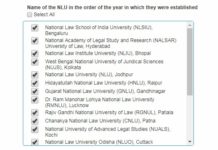This article has been submitted by Kushagr Bakshi for the CLATGyan Blog Post Writing Competition. If you think this article is a good read, ‘Like’ this article on Facebook (the button is at the bottom of this piece) or post a comment using the ‘comments’ section below.
***
There was unusual, almost reverent silence as Mr.Macpherson, then clerk of the Congress, passed the final count of the roll call vote to Mr.Colfax, then speaker of the Congress.
“The final count of the vote of the Congress on the matter of the 13th amendment to the United States constitution is 56 against and 119 for.”
As the impact of the statement hit the members, there were overwhelming exclamations, some of joy, some of disappointment but overall, there was jubilation as the members joined in the singing of the “Battle Cry of Freedom”. Every Single man, irrespective of their color was now free!
As a then representative of the Congress, Thaddeus Stevens would later describe it, “The greatest measure of the 19th century, passed by corruption aided and abetted by the greatest man in all of America!” This great man, as I’m sure all our history books have taught us by now, was none other than ‘Honest’ Abe Lincoln.
Initially, when the amendment was introduced, the Republicans were some votes short of the required majority. Some of the representatives, on the president’s behest went about pleading, convincing, reasoning and even bribing democrats to vote for the amendment. Mr.Yeaman, Mr.Coffroth, Mr.MacAllister and 13 other democrats were won over by these ‘pleas’, some for money, some for government jobs and some for the emotional appeal made by the president himself. Of course, then no one would dare challenge the honor of a congressman. Only now, a few books and a couple of movies later, do we know the truth.
Corruption (called the root of all evil by our very own Kejru) is the reason what is arguably the most impactful legislation of the 19th century was passed by the Congress, allowing all men to be free and be judged not by the color of their skin but by the content of their character.
Coming back to the 21st century India, a speeding biker is caught by the traffic police. He is probably in a hurry to reach office on time to avoid the wrath of his bosses. The policeman will now ask for his license, his PUC, his credentials and then shall write him a ticket which he later has to pay. While all of this is happening, the biker slips the policeman say a hundred rupees. The policeman, surviving on a salary as good as non-existent is happy to receive the money. The biker saves precious time. No one is hurt. Everyone is happy. Of course, this falls apart if the biker is drunk or is driving recklessly, in which case he would definitely go on to hurt himself, and more importantly probably hurt others.
Now, let us take a look at the practical advantages of corruption in India. The Indian judicial system is probably the most tedious system and it takes a lot of time to navigate through this judicial mess. A good six to seven hours are wasted for probably very inconsequential things. A working professional does not have the time to spare usually finds it more convenient to pay their way through this judicial thicket! The taker of this bribe is mostly a clerk or some other miniscule court official whose salary again is a pittance. At the end of the day, money is earned, time is saved and people are happy. The problem though kicks in when such people refuse to work without bribes.
On a bigger level, corruption in my opinion is passable as long as there is development to accompany it. Adolf Hitler is reported to have taken bribes from industrialists to promote the interests of the Nazi party in exchange for special privileges. Pre World War II, however, Germany was the only country to have zero unemployment and zero people living in poverty. From the ashes of the Weimar republic he carved out the powerful Third Reich which fought single handedly for so long and defeated many allied countries. Herr Hitler was the perfect example of corruption with development before he went, for lack of a more accurate word, nuts. Indian politicians are obviously far from this. Recent political changes do however give me hope!
And as a final argument, as a learned friend of mine suggested, corruption brings entertainment. Half of the sports we watch on T.V are fixed. The IPL betting scandal is just the tip of the iceberg. Ask yourself what we would do without this premeditated yet so entertaining twists and turns of a cricket or football game. If all corruption were to stop, I wonder what the news channels will show for prime time new. Weather broadcasts maybe?
I’m not propagating corruption, in spite of my comments above. I’m simply saying that it does have practical benefits that even Mr. Kejru and his Mango People Party cannot deny.
After all, ask yourself, would you rather spend six hours of a Monday morning and afternoon at the court of small cases or pay a hundred rupees as a bribe?
Cheers!
(Note: Some of the legal details mentioned may be inaccurate and some factual ones exagerrated. After all, I’m just a law school aspirant, not a student yet. Thank you for reading!)
***
Kushagr Bakshi is a seventeen-year-old law school aspirant from Bombay. He loves writing, music, cricket and MUNning. He considers himself a true Rumrunner and is a huge fan of the Lord of the Rings. He decided that he was suited for neither engineering, not medicine after having studied Science in school. Thereafter, he developed a passion for the law at a Saurav Datta lecture, and has had a whirlwind ride ever since. He believes that India ought to be a dictatorship and not a democracy (we vehemently disagree, unless we are the dictators. Abki baar CG sarkar, anyone?) and that one must do stupid things to enjoy life. He invites anyone offering free food to make his acquaintance.















passion for law after dutta’s lecture huh? =))
anyhow, well done! its a good read. 😀
You do have a point. Corruption is practically helpful but the question is to whom? Only a certain section of society which possesses the resources to indulge in it. The entertainment, the benefits are available to people who can afford it. What about people who are promised grants under a certain scheme but end up not receiving it because officials appropriate it for themselves? Or are we not supposed to care because at the end of the day we all aim to be middle class upwardly mobile professionals so why is it any concern of us if a few thousand people remain underdeveloped and poor right? And let’s say corruption is somewhat good because things like the 13th amendment could be passed. But what if in the future these things are overturned because of the improper manner in which they were passed? Anything with a flawed base always ends up cracking in the end no matter how good it”s intentions may be. Also an economy where industrialists can control politicians through money may prosper in the beginning but in the long term this can have far reaching consequences. Industrialists can steal land, influence government policies for their own interest, and get rid of those who interfere with their interests. In a democracy I’d rather my government be controlled by the party I elected than the guy who’s paying bribes to them and whom I have no idea about. We might as well as have a ‘system of bribery’ wherein we elect the one who’s willing to shell out the most. This is just my opinion, no offence.
Hi Megha! Sorry about the ridiculously late reply. No so I agree that corruption has disadvantages, major ones which leave our society crippled in many forms. My objective in this article was merely to provide an alternative opinion. a different view of things as compared to the traditional Mango People’s Party view. But yes, You have an excellent point!
Lovely!!! I have one suggestion though, you can also write one poem on ‘corruption’.. sounds interesting??